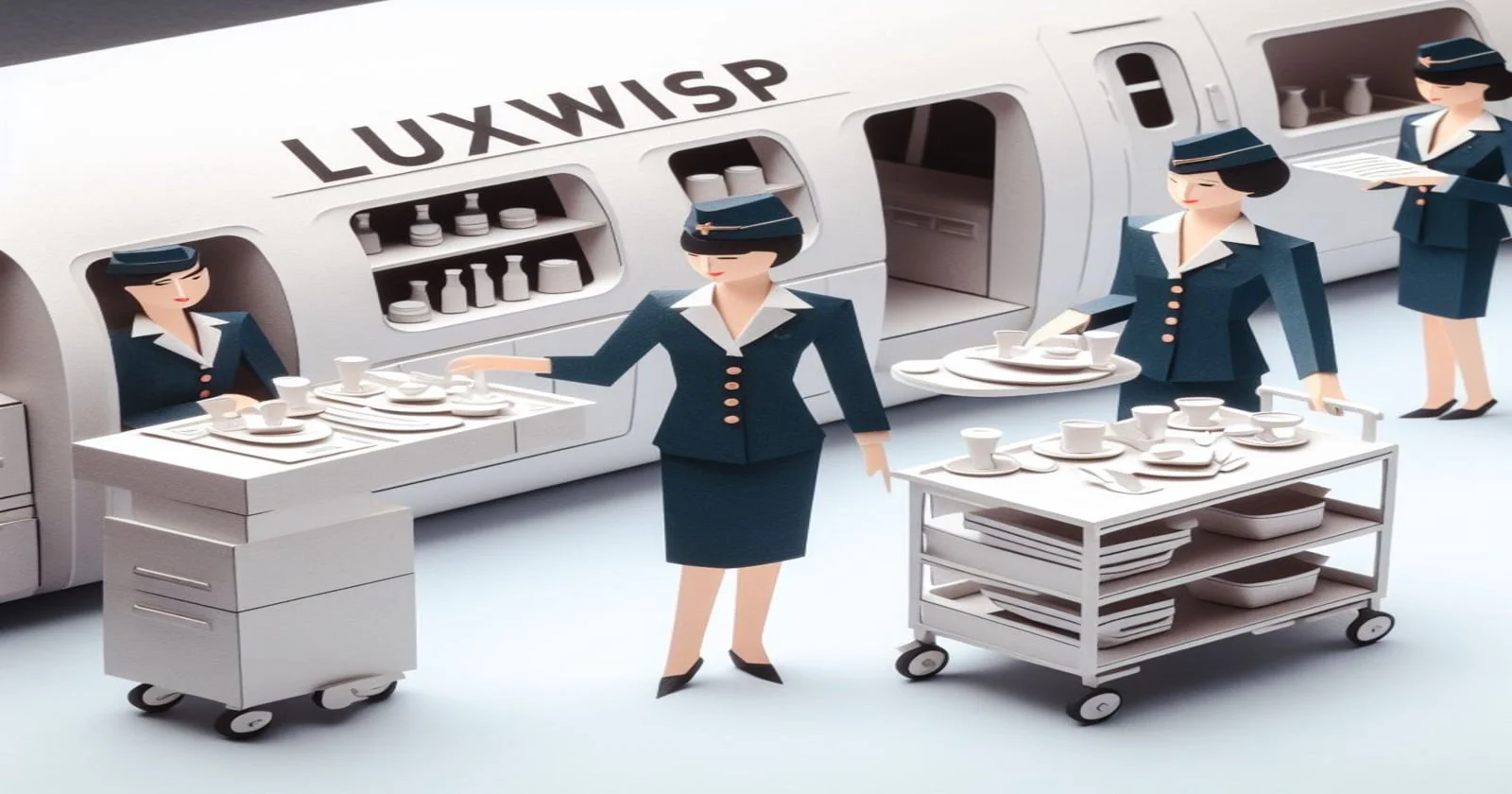The pros of Being a flight attendant are paid travel, flexible schedules, and standby travel options. The role includes comprehensive training, opportunities to meet new people, health benefits, and travel discounts. It emphasizes developing crisis management and communication skills and offers a structured career path with a focus on professional appearance.
The cons of being a flight attendant are long working hours, potentially leading to physical exhaustion and illness exposure. Frequent travel can result in missing significant events and challenges in maintaining personal relationships. Isolation is common, with attendants often alone in hotel rooms. Additionally, being on call for six days monthly intensifies the job’s demands.
Flight attendants navigate a whirlwind of red-eye flights and bustling galleys, serving diverse pax during layovers. Their routine includes quick turnarounds and deadheading to new destinations, all while managing jump seats and adhering to FAA guidelines. Despite the challenges, like ensuring chocks and performing crosschecks, the job offers immense personal growth, making every demanding shift worthwhile.

Key Takeaways:
- Travel opportunities to various destinations around the world
- Exposure to different languages, customs, and traditions
- Personal growth and development through exposure to different cultures and experiences
- Language immersion and networking opportunities
Fascinating Insights into the World of Flight Attendants:
- Earnings:
- As of May 2022, the median annual wage for flight attendants stood at $63,760.
- The average earnings for these professionals was $67,020.
- The top 10% of flight attendants earned a whopping $97,170 or more annually.
- On the flip side, the lower 10% made under $37,690 each year.
- Industry-specific Earnings:
- Within the Scheduled Air Transportation sector, the average annual earnings was $67,110.
- Flight attendants in the Nonscheduled Air Transportation industry earned even more, averaging $72,170.
- Employment Statistics:
- In 2022, there were 111,100 jobs for flight attendants.
- Exciting news for aspiring flight attendants: The employment rate is expected to soar by 11% from 2022 to 2032. This growth is much faster compared to many other professions.
- Annually, there will be around 16,600 job openings over the next decade. A significant portion of these openings will emerge as current professionals move to other roles or retire.
| Pros of Being a Flight Attendant | Cons of Being a Flight Attendant |
|---|---|
| Travel Opportunities | Irregular Hours |
| Flexible Schedules | Physical Strain |
| Meeting New People | Jet Lag |
| Free or Discounted Travel Benefits | Emotional Stress |
| Developing Crisis Management Skills | Away from Home |
| Health Benefits | Exposure to Illness |
| Uniform and Professional Appearance | Job Security Concerns |
| Structured Career Path | Limited Personal Time |
| Cultural Competency | Strict Appearance and Conduct Standards |
| Workplace Variety | Initial Financial Strain |
Pros of Being a Flight Attendant
- Travel Opportunities: Being a flight attendant offers the unique opportunity to visit numerous destinations around the world, often at no cost. This provides a chance to immerse oneself in different cultures, cuisines, and environments that many others only dream of. Over time, this exposure can lead to a broader worldview and increased personal growth.
- Flexible Schedules: Flight attendants often work on a rotational basis, which means they may have several days off in a row after a series of flights. This can allow for extended breaks, offering a chance to recover from work or enjoy personal hobbies and activities without the typical constraints of a 9-5 job.
- Meeting New People: Every flight brings a new set of passengers and potential interactions. Flight attendants get to meet and converse with people from all walks of life, from businessmen to vacationers to celebrities, fostering interpersonal skills and networking opportunities.
- Free or Discounted Travel Benefits: Many airlines offer their flight attendants free or heavily discounted tickets, allowing them and sometimes their families to travel for personal reasons. This perk can lead to significant savings, especially for those who love to explore the world.
- Developing Crisis Management Skills: Flight attendants are trained to handle various emergencies, from medical situations to unexpected turbulence. This training not only ensures passenger safety but also imparts valuable crisis management skills that can be beneficial in other life situations.
- Health Benefits: Due to the physical nature of the job, which often involves walking, lifting, and standing, flight attendants can maintain better physical health. Many airlines also provide comprehensive health and dental plans, ensuring their well-being.
- Uniform and Professional Appearance: Wearing a uniform can instill a sense of pride and professionalism. It helps in promoting the airline’s brand, ensures that the crew is easily identifiable, and reduces the stress of choosing daily work attire.
- Structured Career Path: The aviation industry provides a clear career progression for flight attendants. With experience, one can move up to senior positions, undertake training roles, or even transition to other roles within the airline.
- Cultural Competency: Regularly interacting with people from diverse cultures and backgrounds enhances a flight attendant’s cultural competency. This can be a valuable skill in today’s globalized world, fostering mutual respect and understanding.
- Workplace Variety: Unlike desk jobs, being a flight attendant ensures that every day is different. Different routes, passengers, and challenges ensure that the work environment remains dynamic and engaging.

Cons of Being a Flight Attendant
- Irregular Hours: Flight schedules can be erratic, leading to irregular sleeping patterns. Early morning flights, red-eyes, or long-haul flights can disrupt the body’s natural rhythm, potentially leading to health issues.
- Physical Strain: The job can be physically demanding. Constantly being on one’s feet, pushing carts, and dealing with turbulence can lead to physical fatigue and long-term ailments, such as back problems.
- Jet Lag: Constantly crossing time zones can result in persistent jet lag. This can affect the body’s internal clock, leading to fatigue, disorientation, and other health concerns.
- Emotional Stress: Dealing with difficult passengers, coping with emergencies, or managing conflicts can be emotionally taxing. Flight attendants often have to maintain calm and professional demeanors even when faced with challenging situations.
- Away from Home: Being on the move means spending a significant amount of time away from home and loved ones. This can lead to feelings of loneliness or missing out on important family events and milestones.
- Exposure to Illness: Flight attendants come into contact with numerous people in close quarters, increasing the risk of exposure to contagious diseases or illnesses.
- Job Security Concerns: The aviation industry can be volatile, with external factors like economic downturns, pandemics, or geopolitical events affecting job security.
- Limited Personal Time: Layovers might seem like an opportunity to explore, but they can often be short, leaving limited time for personal relaxation or sightseeing.
- Strict Appearance and Conduct Standards: Many airlines have stringent guidelines regarding appearance, including weight, grooming, and attire. Constantly adhering to these standards can be stressful for some individuals.
- Initial Financial Strain: Training to become a flight attendant often requires a financial investment, and starting salaries might not be very high. It might take a while before one can fully benefit from the perks of the job.

Travel Opportunities
Flight attendants enjoy a multitude of travel opportunities. Not only do they get to visit various destinations around the world, but they also have the chance to experience different cultures and explore new places.
One of the perks of being a flight attendant is the ability to fly for free or at discounted rates. This means that they can take advantage of their time off and travel to their dream destinations without breaking the bank.
Another advantage of being a flight attendant is the ability to have layovers in different cities.
During these layovers, flight attendants have the opportunity to explore the local attractions, try new cuisines, and immerse themselves in the local culture. It’s like having a mini-vacation within their work schedule.
Moreover, flight attendants often have the option to bid for flights to specific destinations. This allows them to have some control over their travel experiences and choose destinations that interest them the most.
Whether it’s a tropical beach getaway or a bustling city adventure, flight attendants can tailor their travel experiences to their preferences.
Meeting New People

One of the flight attendant’s favorite aspects of the job is the opportunity to meet new people from all walks of life. Being a flight attendant allows them to interact with a diverse range of individuals, creating unique and memorable experiences. Here are five reasons why meeting new people is such a rewarding part of the job:
- Cultural Exchange: Flight attendants have the chance to learn about different cultures, traditions, and languages from passengers hailing from various countries.
- Interesting Stories: Every passenger has a story to tell, and flight attendants get to hear fascinating tales of adventure, love, and personal experiences.
- Networking Opportunities: Meeting professionals from different industries can lead to valuable connections and potential career opportunities.
- Making New Friends: Flight attendants often form lasting friendships with passengers, creating bonds that extend beyond the duration of the flight.
- Broadening Perspectives: Interacting with people from different backgrounds broadens the flight attendant’s worldview, fostering tolerance, empathy, and understanding.
Cultural Experiences

Being a flight attendant offers a unique opportunity for cultural experiences.
Flight attendants have the chance to gain a global perspective by interacting with people from different countries and backgrounds.
Additionally, they may have the opportunity to immerse themselves in different languages, further enhancing their cultural understanding.
Global Perspective Benefits
While traveling to different countries, flight attendants gain a global perspective and experience diverse cultures. This aspect of their job allows them to broaden their horizons and develop a deeper understanding and appreciation for the world we live in.
Here are some of the benefits flight attendants enjoy in terms of cultural experiences:
- Exposure to different languages, customs, and traditions.
- Opportunities to taste and savor various cuisines from around the world.
- Witnessing breathtaking landmarks and exploring new destinations.
- Interacting with people from different backgrounds and learning from their perspectives.
- Developing a sense of empathy and cultural sensitivity.
These experiences not only make the job of a flight attendant exciting but also contribute to personal growth and a broader global outlook. Flight attendants become cultural ambassadors, fostering connections between people from different countries and promoting understanding and acceptance.
Language Immersion Opportunities

Flight attendants have the chance to immerse themselves in different languages and cultures, allowing them to expand their linguistic skills and cultural understanding. This is one of the major benefits of being a flight attendant.
As they travel to various destinations around the world, flight attendants are exposed to different languages on a daily basis. They have the opportunity to interact with passengers from different countries and learn phrases and expressions in multiple languages. This language immersion not only helps them communicate effectively with passengers but also allows them to develop a deeper appreciation for different cultures.
Flight attendants can learn about local customs, traditions, and cuisines, which enriches their overall cultural experience. By embracing language immersion opportunities, flight attendants can broaden their horizons and become more cosmopolitan individuals.
Irregular Schedules

With their constantly changing itineraries and unpredictable hours, flight attendants often struggle to maintain a regular schedule. The nature of their work requires them to adapt to irregular schedules, which can have both advantages and disadvantages. Here are some pros and cons of having an irregular schedule as a flight attendant:
- Exciting and dynamic: Flight attendants get to experience different destinations and cultures, making their job exciting and never boring.
- Flexibility: Irregular schedules can provide flexibility in terms of time off and swapping shifts with colleagues.
- Travel perks: Flight attendants often enjoy discounted or free travel benefits, allowing them to explore the world during their downtime.
- Disruption to personal life: Irregular schedules can make it difficult for flight attendants to maintain relationships or spend time with loved ones.
- Sleep disruption: Frequent time zone changes and irregular working hours can lead to sleep disturbances and jet lag.
Flight attendants must be prepared for the challenges that come with their irregular schedules. While the opportunity to travel and experience new things is enticing, it’s important to consider the impact it may have on personal life and well-being. Despite the cons, many flight attendants find the rewards of their job outweigh the challenges.
Long Working Hours

How do flight attendants manage their personal lives and well-being despite the long working hours? Being a flight attendant often means working irregular and long hours, which can take a toll on one’s personal life and overall well-being. However, flight attendants have developed various strategies to cope with these challenges.
Flight attendants understand the importance of maintaining a healthy work-life balance, so they prioritize self-care. They make sure to get enough rest, exercise regularly, and eat nutritious meals. Moreover, they find ways to relax and unwind during their downtime, such as practicing yoga or meditation.
To manage their personal lives, flight attendants often have to carefully plan their schedules and make the most of their time off. They may rely on supportive friends and family members who understand the demands of their job. Communication is key, and flight attendants make efforts to stay connected with their loved ones despite the distance and time differences.
While the long working hours can be physically and mentally challenging, flight attendants find fulfillment in their job. They enjoy the opportunity to travel and explore new places, meet different people, and provide exceptional customer service. Despite the sacrifices they make, flight attendants remain dedicated to their profession and find ways to balance their personal lives and well-being.
Physical Demands

Despite the demanding nature of their job, flight attendants must prioritize their physical health and well-being. The physical demands of being a flight attendant can take a toll on the body, but with proper care and attention, they can ensure their physical fitness to continue performing their duties efficiently. Here are five key physical demands that flight attendants face on a daily basis:
- Constant standing: Flight attendants spend long hours on their feet, serving passengers and ensuring their comfort and safety throughout the flight.
- Heavy lifting: They’re responsible for handling heavy bags and luggage, loading and unloading them from overhead compartments and cargo holds.
- Maneuvering in tight spaces: Flight attendants must navigate through narrow aisles, cramped galley areas, and crowded cabins, often requiring them to contort their bodies in different positions.
- Exposure to altitude and temperature changes: Being on board an aircraft exposes flight attendants to rapid changes in altitude and temperature, which can affect their bodies and require adjustments.
- Emergency situations: Flight attendants must be physically fit to handle emergency situations, including assisting passengers during evacuations, carrying out first aid procedures, and managing the safety of everyone on board.
Personal Growth and Development
Becoming a flight attendant offers numerous opportunities for personal growth and development. Through their experiences in the aviation industry, flight attendants acquire a range of valuable skills that can benefit them both personally and professionally.
Additionally, the nature of the job allows for self-discovery and the chance to explore different cultures and destinations, which can contribute to personal growth.
Moreover, the responsibilities and challenges of being a flight attendant can greatly impact one’s confidence and self-esteem.
Skills Acquired Through Experience
Flight attendants develop exceptional communication skills through their experience in dealing with diverse passengers and handling various in-flight situations. This profession not only provides opportunities for personal growth and development but also equips individuals with valuable skills that can be applied in various aspects of life.
Some of the skills acquired through experience as a flight attendant include:
- Effective communication: Flight attendants learn how to communicate clearly and effectively with passengers, colleagues, and other airline staff.
- Problem-solving: Dealing with unexpected situations during flights requires quick thinking and problem-solving skills.
- Conflict resolution: Flight attendants often encounter conflicts between passengers or with difficult individuals and learn how to defuse tense situations.
- Adaptability: Working in different time zones, dealing with changing schedules, and adjusting to different cultures and languages enhances adaptability.
- Customer service: Providing excellent customer service is a crucial skill that flight attendants develop through constant interaction with passengers.
These skills acquired through experience as a flight attendant can be valuable in various career paths and contribute to personal growth and development.
Opportunities for Self-Discovery

While working as a flight attendant, individuals have the opportunity to discover more about themselves and experience personal growth and development. The nature of the job exposes them to various challenges and situations that require adaptability, problem-solving skills, and effective communication.
Through interacting with passengers from different backgrounds and cultures, flight attendants learn to navigate diversity and develop a greater sense of empathy and understanding. They also learn to manage their emotions and remain calm in stressful situations, enhancing their emotional intelligence.
The constant exposure to new places and experiences allows flight attendants to step out of their comfort zones and explore their own boundaries. This leads to personal growth and self-discovery as they gain confidence, independence, and a broader perspective on life.
Impact on Personal Confidence
Often, flight attendants find that their experiences in the job greatly boost their personal confidence and contribute to their personal growth and development. Being a flight attendant can have a transformative effect on an individual’s self-assurance and overall outlook on life. Here are five ways that being a flight attendant can impact personal confidence:
- Exposure to diverse cultures and languages, fostering a more open-minded and adaptable mindset.
- Dealing with challenging situations, such as medical emergencies or difficult passengers, builds resilience and problem-solving skills.
- Developing excellent communication and interpersonal skills through constant interaction with passengers and crew members.
- Gaining a sense of independence and self-reliance by navigating unfamiliar cities and countries.
- Overcoming fears and anxieties associated with flying and public speaking, leading to personal growth and increased self-esteem.
Flight attendants often find that these experiences help them become more confident individuals, both personally and professionally.
Frequently Asked Questions
What Are the Requirements and Qualifications to Become a Flight Attendant?
To become a flight attendant, one must meet certain requirements and qualifications. These typically include a high school diploma or equivalent, fluency in English, good physical health, and excellent customer service skills.
How Is the Salary and Compensation Structure for Flight Attendants?
Flight attendants receive a competitive salary and compensation package. They enjoy benefits such as travel perks, health insurance, and retirement plans. The average annual salary for flight attendants in the United States is around $56,000.
Do Flight Attendants Receive Any Benefits Such as Medical Insurance or Retirement Plans?
Flight attendants receive benefits such as medical insurance and retirement plans. These benefits help ensure their well-being and security. They can access medical coverage and have the opportunity to save for their future.
How Often Do Flight Attendants Have to Relocate or Change Their Home Base?
Flight attendants frequently relocate or change their home base. This can be both exciting and challenging, as it allows them to experience different cities but also requires them to adapt to new environments and build a new support system.
Are There Any Specific Dangers or Safety Concerns That Flight Attendants Need to Be Aware Of?
Flight attendants must be aware of specific dangers and safety concerns. These include turbulence, cabin fires, emergency landings, and unruly passengers. Maintaining vigilance and undergoing regular safety training are crucial for their job.













